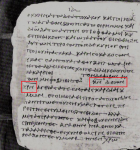I feel like I’m only repeating myself. “Geographic attestation” is only one half of the argument. It is only one part of the argument as a collective whole.
It is not simply that a reading is attested in multiple textual streams, but that it is also an (emphasis added)
early exemplar of such, of which 1 Peter 3:15 is. By citing 15th c. versional witnesses (as you continue to do, even in this post), it does not have the same weight. It only shows that by the 15th, 16th, and 17th c., that this reading was attested throughout the world, but that rather begs the question. In the scenario I have presented, it shows that κύριον δὲ τὸν Χριστὸν (“Christ as Lord”) is not only the earliest attested, but also (and more importantly)
attested very early on in various textual streams. That means it was
the most commonly known reading of the text in the “Christian world” by the 4th c., with absolutely no evidence that “God as Lord” antedates such reading. This is not an “either/or” argument, it’s a “both are true” argument: It is both, the earliest (emphasis added)
and the most broadly attested throughout the Christian world by the 4th c. The fact that κύριον δὲ τὸν Χριστὸν (“Christ as Lord”) is found early on in various textual streams weighs heavily. Your favored reading does not have this kind of early/broad attestation.
So in light of this, by bringing up more modern Spanish, German, Italian versions, this does not quite carry the same weight. The only thing you prove by it took 16 centuries for “God as Lord” before it became widespread. So this really does not work in favor of your argument, but counteracts it.
You keep stating that the NA28 lists add’l justification for “God as Lord,” but it does not mention anything any differently than what I have been saying this entire time. Do not forget that in the primary text, NA28 has κύριον δὲ τὸν Χριστὸν (“Christ as Lord”), and gives this the reading primacy over “God as Lord.”
The question you are failing to ask yourself, is this: “What textual apparatus’ were used in the translation of the German Luther Bible, the Spanish Sagradas, the Patriarchal Text of 1904 (which is the standard text used by the Eastern Orthodox), the Standard Portuguese Bible (1681), the Hungarian Version, the Russian Synodal Version?” You will be quite surprised to find many of these versions use the same apparatus’ that underly the KJV. Thus, they are just copies of the same materials used to translate the KJV. That does not constitute early, widespread attestation.
Now let's address snapshot from NA28,
View attachment 249459
But you do realize that this is the lacunae, right? All the references in the table above (including the portion in red) are the portions of the mss that are missing. If you were familiar enough with Ephraemi, you would know this. For example, here is a snapshot of Tischendorf’s transcription of Ephraemi at 1 Peter 1:1-2 (see portion highlighted in red, below),
View attachment 249460
One can see from this that that 1 Peter 1:1-2 is lacunae. So in summary, each of the passages that are listed in the referenced table above are all considered lacunae, and the verses that
are not listed are actually what are present in the mss. If you simply read what NA28 says, it explains it.
Further, you then post the following image:
View attachment 249461
But you never identify the mss. However, when I first saw it, I immediately identified it as papyri 72. I could tell from the style of writing and the material it was written on. And to confirm my suspicion, here is the exact folio as seen on CSNTM (
https://manuscripts.csntm.org/manuscript/view/GA_P72):
View attachment 249462
For what purpose did you decide to include a photo of p72? p72, as shown in above photograph, is not on your side, but as evidenced in the NA28, UBS, and other critical editions, supports κύριον δὲ τὸν Χριστὸν (“Christ as Lord”).
Here is p74:
https://manuscripts.csntm.org/manuscript/Group/GA_P74
And here is p81:
https://manuscripts.csntm.org/manuscript/Group/GA_P81
Can you please show me 1 Peter 3:15 in either of them? No, you cannot. So I guess thanks for wasting my (including yours) time?
3







